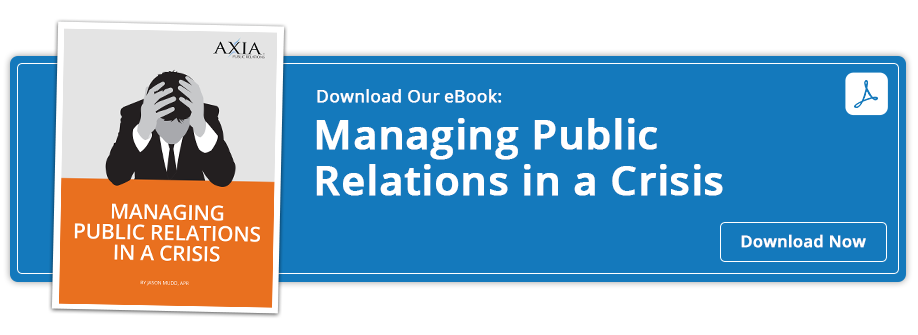 How your company should respond to a social media attack
How your company should respond to a social media attack
A great illustration of mob mentality is the scene in Disney’s Beauty and the Beast when the townspeople amass and call for the Beast’s head. Can you imagine what that would be like today if the mob flocked to social media and the Beast was a company that people felt had “wronged” them in some way? The Beast would have a sea of virtual torches and pitchforks at his company’s door. Without a PR firm, that business could be doomed.
Navigating social media and the public can be tricky. A single negative post concerning even a well-established company can go viral in an instant.
One of our clients came under attack when it became public knowledge that the new owner of the beloved business had removed the company’s founder and previous owner from company leadership and property. Our client was under attack, virtual pitchforks and all, 24 hours a day for days on end. This included threats to the new owner, the employees and the spaces they occupied. Angry consumers also proposed a boycott.
Here is a list of the eight things your company can learn from our client’s experience.
1. Hire a PR firm
Hiring a PR firm is a step in the right direction to prepare your business for the best and worst situations. Waiting to engage a PR firm until after you find yourself in a crisis situation will delay your response time and deny you the opportunity to hire the best firm under ideal circumstances. The best PR comes from being proactive.
2. Listen to the experts
Listening to your PR team’s recommendations is a must; if you don’t, why did you hire them in the first place? Too often, clients trust their instincts first, then opt to take the PR firm’s advice later. Be sure you fully consider your team’s experience and recommendations, even – and especially – when it’s hard to hear.
3. Create a message
Create the perfect message for your audiences. In your message, apologize when appropriate, offer a way for consumers to connect with you offline and ask them to consider utilizing your services in the future. If needed, give a brief explanation of the situation.
4. Don’t block
Unless someone is extremely rude, vulgar or uses expletives, we do not recommend blocking or removing any posts. It only gives them another reason to be angry at you and at the situation, and they will share their frustrations publicly via other platforms.
5. Respond and let it ride
It’s important to make a concerted effort during your business hours to respond to people who reach out to you on social media. It is also important to remember that there is a time and a place to let the mob mentality wear itself out. When responding:
-
Apologize for the situation.
-
Work to rectify any issues you can address.
-
Continue with business as usual.
-
If necessary, increase your language filters and post settings on social media channels.
-
Stay positive.
-
Have a thick skin.
-
Don’t take it personally.
-
Take a few blows, if necessary, to take one for the team.
-
Don’t respond in anger and do not make personal attacks.
-
Don’t share any confidential information.
-
Don’t offer more detail than was originally provided.
-
Don’t post overnight when you may be tired, more emotional and may not have the best clarity.
6. Offer an outlet
Provide a way for customers to share their feedback via private message, email or another source, like Axia’s ReviewMaxer software. Keep in mind that, if it gets far enough out of hand, it is possible to disable wall posts for a Facebook page and direct people to send private messages instead.
7. Employees matter
Remind employees that they represent your company and should recognize that posting on social media can impact the company, their employment, the livelihood of their co-workers and the business’ relationship with customers. It is important to encourage employees to engage only in positive interactions and to never get defensive. We created a blog post to help employers and employees learn how to interact on social media.
8. Anything is fair game
Remember that anything you send to employees via text, email or social media (your company page or your private page) is ultimately fair game. Employees and customers alike can easily screenshot content and posts you thought were private or deleted.
Don’t let the social media mob mentality overtake you or your business. Responding is important and it’s just as important to stay positive and take the high road by not taking comments and posts personally. For our client, change was inevitable, though it isn’t always comfortable. Staying the course, acknowledging the change and moving forward is the best course of action.
These are the eight biggest lessons our client learned throughout its crisis. Having acted on these tips, within a rough 48 hours, our client was back to enjoying record-breaking sales based on the new ownership’s vision and financial commitment.
To learn more about how you can prepare your company to weather any storm, download Axia Public Relations’ e-book Managing Public Relations in a Crisis.
 Marjorie Comer is an award-winning PR professional at Axia Public Relations. She graduated from Rockhurst University with a Bachelor of Arts in communication. Marjorie cheers for her hometown Kansas City Royals. Follow her on Twitter @Marjorie_Comer.
Marjorie Comer is an award-winning PR professional at Axia Public Relations. She graduated from Rockhurst University with a Bachelor of Arts in communication. Marjorie cheers for her hometown Kansas City Royals. Follow her on Twitter @Marjorie_Comer.
Featured image: Creative Commons
Topics: public relations, reputation management, crisis communications, inbound marketing, online reputation management, shared media


Comment on This Article